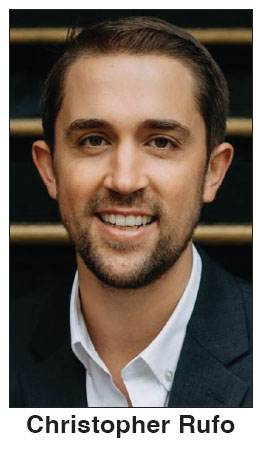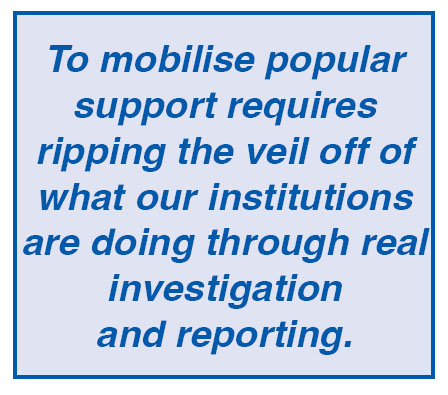Laying siege to the institutions by Christopher F. Rufo
Why do I say that we need to lay siege to our institutions? Because of what has happened to our institutions since the
1960s. The 1960s saw the rise of new and radical ideologies in
America that now seem commonplace — ideologies based on
ideas like identity politics and cultural revolution.
Because of what has happened to our institutions since the
1960s. The 1960s saw the rise of new and radical ideologies in
America that now seem commonplace — ideologies based on
ideas like identity politics and cultural revolution.
The leftist dream of a working-class rebellion in America fizzled after the '60s. But the leftist dreamers didn't give up. Abandoning hope of a Russian-style revolution, they settled on a more sophisticated strategy — waging a revolution not of the proletariat, but of the elites, and specifically of the knowledge elites.
It would proceed not by taking over the means of production, but by taking control of education and culture — a strategy that German Marxist Rudi Dutschke, a student activist in the 1960s, called "the long march through the institutions". This idea is traceable to Italian communist Antonio Gramsci, who wrote in the 1930s of "capturing the culture via infiltration of schools, universities, churches and the media by transforming the consciousness of society".
This march through our institutions, begun a half-century ago, has now proved largely successful. Over the past two years, I've looked at the U.S. federal bureaucracy, the universities, K-12 schools and big corporations. And what I've found is that the revolutionary ideas of the '60s have been repackaged, repurposed and injected into American life at the institutional level.
Most Americans are shocked to discover this. We've all seen the outrage of parents over the past two years as they learned that their young children were being divided according to their skin colour and deemed oppressed or oppressors in public school classrooms.
The lesson I've drawn from reporting on institutions that promote ideologies such as critical race theory and radical gender theory is that they have been captured at the structural level and can't be reformed from within. So the solution is not a long counter-march through the institutions. You can't replace bad directors of diversity, equity and inclusion with good ones. The ideology is baked in. That's why I call for a siege strategy.
 This means, first, that you have to be aggressive. You have
to fight on terms that you define. In responding to opponents
of the Florida bill, for instance, don't argue against "teaching
diversity and inclusion", but against sexualising young children.
And don't pull your punches.
This means, first, that you have to be aggressive. You have
to fight on terms that you define. In responding to opponents
of the Florida bill, for instance, don't argue against "teaching
diversity and inclusion", but against sexualising young children.
And don't pull your punches.
We will never win if we play by the rules set by the elites who are undermining our country. We can be polite and lose every battle or we can be impolite and actually deliver results for the great majority of Americans who are fighting for their small businesses, fighting for their jobs, fighting for their families.
Second, you have to mobilise popular support. This requires ripping the veil off of what our institutions are doing through real investigation and reporting so that Americans can make informed choices. We live in an information society, and if we don't get the truth out, we will never gain traction against the narratives being constantly refashioned and pushed by the Left.
Less than two years ago, an infinitesimal number of Americans knew about critical race theory. Through investigation and reporting, we've brought that number up to 75 per cent.
The public now opposes critical race theory by a two-to-one margin, and it is being hounded out of schools and other places. This kind of action is a model for dealing with every ideology and institution that is undermining the public good and America's future.
Remember that institutions don't choose these ideologies democratically — they don't ask people or employees to vote for them. They impose them by fiat, through bureaucratic, not democratic rule. So it isn't surprising that the institutions lose big when we force their agendas into the political arena.
What politician or campaign manager in their right mind would ignore an issue that is supported by a two-to-one margin? So-called conservative politicians who do ignore such issues — or who oppose bringing them up out of a false sense of decorum — aren't on the people's and the country's side.
With public institutions like K-12 education, another crucial step is to decentralise them. It is centralisation and bureaucratisation that makes it possible for a minority of activists to take control and impose their ideologies.
Decentralising means reducing federal and state controls in favour of local control — and it ultimately means something like universal school choice, placing power in parents' hands. Too many parents today have no escape mechanism from substandard schools controlled by leftist ideologues. Universal school choice — meaning that public education funding goes directly to parents rather than schools — would fix that.
Conservatives have for too long been resistant to attacking the credibility of our institutions. Trust in institutions is a natural conservative tendency. But conservatives need to stop focusing on abstract concepts and open their eyes. Our institutions are dragging our country in a disastrous direction, actively undermining all that makes America great.
What is needed is to build alternative or parallel institutions and businesses in all areas. Even those of us who are temperamentally predisposed to defence must recognise that offense — laying siege to the institutions — is what is now demanded.
Christopher F. Rufo has directed four acclaimed documentaries,
including most recently America Lost, which explores
life in three "forgotten American cities" — Youngstown,
Ohio; Memphis, Tennessee; and Stockton, California. The
above article is an excerpt from his essay in the April/May
edition of Imprimis, a publication of Hillsdale College,
Michigan, and is reprinted by permission of the publisher.
![]()
